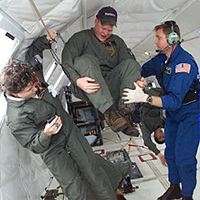USC engineers say solid particles may burn more safely and efficiently in space than gaseous fuels

Researchers from the USC Viterbi School of Engineering say solid fuel particles may be safer for hazardous work environments on earth and burn more efficiently in the microgravity of space than gaseous fuels, which are more combustible and difficult to transport.
In the spring 2004 issue of NASA Space Research, Fokion Egolfopoulos and Charles Campbell of the USC Viterbi School’s department of aerospace and mechanical engineering reported that they have made significant progress toward understanding the complex chemical processes that take place when tiny particles of solid fuels burn.
The duo’s findings could lead to the design of safer and more efficient solid fuels for propulsion in space or for maintaining human outposts on the moon or Mars. Their research could also benefit fire-prevention practices.
“Understanding the thermal effects is a first step toward improving fuel economy in both space vehicles and those we use on Earth,” Egolfopoulos said.
“It’s also a good start towards preventing spontaneous combustion in dangerous work environments, like in lumber milling, in grain elevators or in mine galleries,” he said. “It’s a sort of walk-before-you-run kind of thing.”
Researchers conducted their experiments during each 23-second zero-g interval during the aircraft’s flight.
Funded by NASA, the researchers made detailed studies of solid fuel combustion, including the effects of gravity on the process. They measured the burning characteristics of various solid fuel particles on earth and in microgravity, using NASA’s KC-135 aircraft - known as the “Vomit Comet” - to simulate the weightlessness of space.
“It takes some getting used to, but after a while, you learn to conduct the experiment very precisely,” said Mustafa Gurhan Andac, a postdoctoral research associate from the USC Viterbi School’s combustion and fuels laboratory, who ran the experiments in the nearly weightless environment aboard the NASA aircraft.
“You only have about 23 seconds in zero-g, so you have to be sure to finish the experiment and record the data during those precious seconds of weightlessness.”
In their experiments, the team used two laminar, smooth-burning flames in an “opposed-jet” configuration to compare the consumption of solid fuel and gaseous fuel. The bottom burner slowly spews gas to carry solid fuel pellets to the flame, while the top burner issues particle-free gas to fuel the flame.
“Depending on the prevailing flow conditions and characteristics of the particles, some particles will ignite and burn completely, where others behave as half-inert and burn only partially,” Egolfopoulos said.
The researchers measured particle size, speed and distribution to determine the optimal conditions for efficient combustion.
Researchers are studying how gravity influences the combustion of solid fuels using this opposed jet flame configuration.
“In reduced gravity, a low-speed gas was more effective for complete fuel consumption,” Campbell said. “However, when we ignited the pellets in our laboratory at USC, in earth’s gravity, a much higher gas velocity was needed to carry the pellets to the flame. Increased speed caused some of the fuel pellets to burn incompletely.”
NASA is finding additional applications for the work as the space agency looks to longer spaceflight missions and human exploration of the moon and Mars. In trips to the moon or Mars, solid fuels derived from the lunar or Martian soil, or solid carbon, extracted from the Martian atmosphere, may fuel the astronauts ’ return flights to Earth.
The researchers will present their findings at the 30th International Symposium on Combustion, to be held July 25-30 in Chicago.
Source:
















